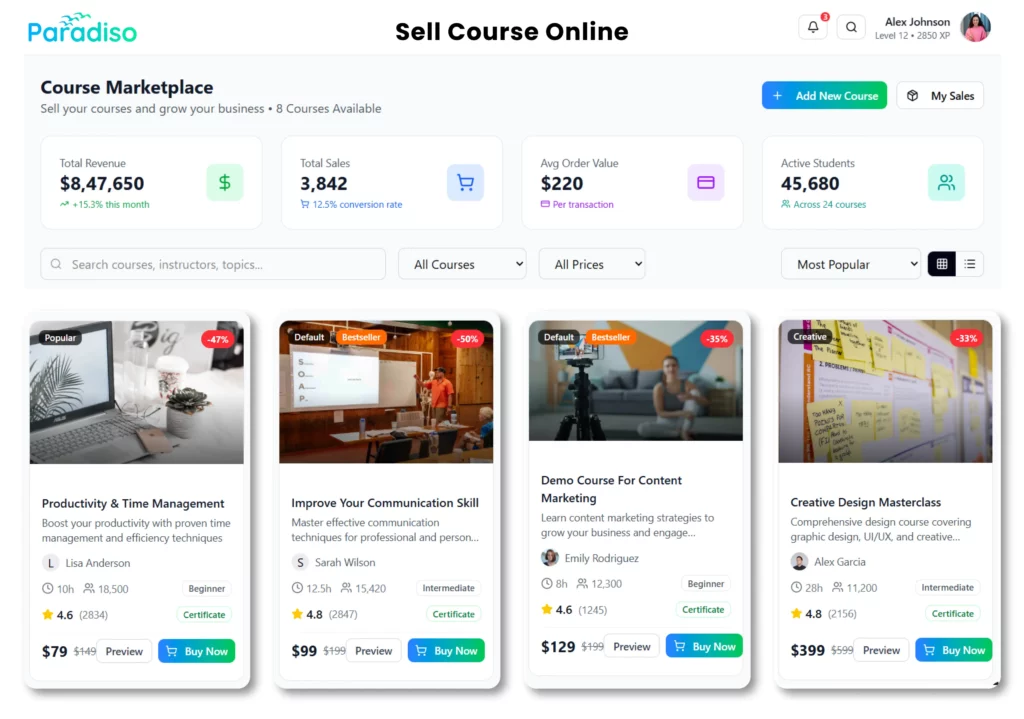The financial services industry is evolving at an unprecedented pace, driven by technological advancements, regulatory changes, and the need for continuous employee upskilling. In this dynamic landscape, a robust Learning Management System (LMS) is no longer a luxury but a necessity. The Best LMS for Financial Services can empower organizations to deliver targeted training, ensure compliance, and foster a culture of continuous learning. But with so many options available, how do you choose the right one? This guide will walk you through the key considerations to help you select the Best LMS for Financial Services in 2025.
Why an LMS is Critical for Financial Services
The financial sector is highly regulated, with stringent compliance requirements that demand ongoing employee training. From anti-money laundering (AML) to data security protocols, employees must stay updated on the latest regulations.
An LMS for Financial Services streamlines this process by providing a centralized platform for delivering, tracking, and reporting on training programs.
Moreover, the industry is increasingly competitive, with fintech disruption challenging traditional institutions.
To stay ahead, financial organizations must invest in upskilling their workforce. An LMS Platform for Financial services can facilitate this by offering personalized learning paths, certifications, and analytics to measure training effectiveness.
Key Features to Look for in the Best LMS for Financial Services
When evaluating an LMS for Financial Services, it’s essential to focus on features that align with your organization’s unique needs. Here are the must-have features to consider:
1. Compliance Management
Regulatory compliance is non-negotiable in the financial sector. The Best LMS for Financial Services should offer built-in compliance tracking, automated reminders, and reporting tools to ensure your organization meets industry standards. Look for platforms that support SCORM and xAPI standards for seamless integration with compliance training modules.
2. Customization and Branding
Your LMS should reflect your organization’s brand identity. Customizable dashboards, logos, and color schemes can enhance user engagement and create a cohesive learning experience. Additionally, the ability to tailor course content to specific roles or departments is crucial for relevance and effectiveness.
3. Mobile Learning Capabilities
With remote work becoming the norm, mobile accessibility is a game-changer. A top-tier Financial Services LMS should offer a responsive design and mobile app support, enabling employees to access training materials anytime, anywhere. This is particularly important for field agents or employees who are constantly on the move.
4. Advanced Analytics and Reporting
Data-driven decision-making is critical in the financial sector. The Best LMS for Financial Services should provide detailed analytics on learner progress, course completion rates, and assessment scores. Advanced reporting features can help you identify skill gaps and measure the ROI of your training programs.
5. Integration with Existing Systems
Your LMS should seamlessly integrate with your existing HR, CRM, and other enterprise systems. This ensures smooth data flow and eliminates the need for manual data entry. Look for platforms that offer APIs and pre-built integrations with popular financial software.
6. Security and Data Privacy
Given the sensitive nature of financial data, security is paramount. Ensure your LMS Platform for Financial services complies with industry standards like GDPR, SOC 2, and ISO 27001. Features like encryption, multi-factor authentication, and role-based access control can further enhance data security.
7. Scalability
As your organization grows, your LMS should be able to scale with you. Whether you’re training 100 employees or 10,000, the platform should handle increased demand without compromising performance. Cloud-based solutions are often the best choice for scalability.
Actionable Tips for Choosing the Best LMS for Financial Services
- Define Your Objectives
Before selecting an LMS, clearly outline your training goals. Are you focused on compliance, employee development, or both? Understanding your objectives will help you prioritize features and narrow down your options. - Involve Key Stakeholders
Engage HR, IT, and department heads in the decision-making process. Their input will ensure the chosen LMS meets the needs of all users and aligns with organizational goals. - Request a Demo
Most LMS providers offer free demos or trials. Take advantage of these to evaluate the platform’s usability, features, and compatibility with your existing systems. - Check Customer Reviews
Look for reviews and case studies from other financial institutions. This will give you insights into the platform’s strengths and weaknesses in real-world scenarios. - Consider Total Cost of Ownership
Beyond the initial purchase price, factor in costs for implementation, customization, and ongoing maintenance. Choose a solution that offers the best value for your budget. - Evaluate Vendor Support
Reliable customer support is crucial for a smooth LMS implementation. Ensure the vendor offers 24/7 support, training resources, and a dedicated account manager.
The Future of LMS in Financial Services
As we look ahead to 2025, the role of an LMS Platform for Financial services will only grow in importance. Emerging trends like AI-driven personalized learning, gamification, and virtual reality (VR) training are set to revolutionize the way financial institutions approach employee development. By choosing the Best LMS for Financial Services today, you can future-proof your organization and stay ahead of the curve.
Conclusion
Selecting the Best LMS for Financial Services in 2025 requires careful consideration of your organization’s unique needs and goals. From compliance management to mobile learning and advanced analytics, the right LMS can transform your training programs and drive business success. By following the actionable tips outlined in this guide, you can make an informed decision that delivers long-term value.
Investing in the right LMS for Financial Services is not just about meeting regulatory requirements—it’s about empowering your workforce, enhancing productivity, and staying competitive in a rapidly changing industry. Start your journey today and unlock the full potential of your organization.












